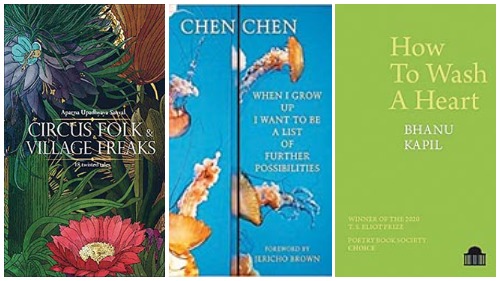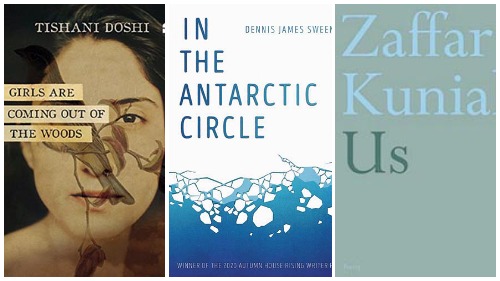Tiger Girl by French-born British poet Pascale Petit was shortlisted for the 2020 Forward Prize for Best Collection. Petit emerges as a strong voice of and for the natural world in this dazzling collection of eco-poems that unfolds like a poetic canopy of lush, throbbing images of the forests and fauna in Central India, dappled by the memories of her grandmother, the tiger girl. She explores her multiracial roots and childhood complexities as she reimagines and reconstructs matrilineal love and loss through the face and history of her ‘tiger-gran’, tracing it in the heart of the beasts and the wild, that is fraught with the ravages of environmental cruelty.
Immigrant identity, queerness, war, violence, nationality, and the quest for love and belonging come up in an intensely personal voice in Vietnamese-American poet, essayist, and novelist Ocean Vuong’s award-winning collection Night Sky with Exit Wounds. Drawing upon Vietnamese oral tradition, Vuong imbues Greek mythology and American iconography in the poems split into three sections — family heritage and the Vietnam war, Vuong’s childhood and family life, his adulthood, and facing the future. Be it ‘Telemachus’, depicting his tenuous and intimate relationship with his father or the much-cited political poem ‘Aubade with burning city’, each poem in the collection soars.
Even after Black Lives Matter stormed right into the face of systemic racism in the US, taking the world by storm, more so recently after the extrajudicial killing of George Floyd, America has largely continued to remain ‘white America’. African-American poet, writer, and performer Danez Smith’s explosive, seminal collection Don’t Call Us Dead: Poems places squarely against that, mashing the spontaneity of spoken word and poetry slam with the sharpness of speech in the structure, form, and style of his poetry. The poetry comes alive, speaking about hope, resistance, and resurrection of the African-American victims of gun violence by the US police that has drained the nation of its soul, faith, and personhood. While every poem is political, some seething with rage, they are also stunningly personal, traversing Smith’s identity as a queer non-binary HIV-positive African-American.

The lines between what passes off as normal and freakish get blurred and are critically looked at in Circus Folk & Village Freaks: 18 Twisted Tales by Aparna Upadhyaya Sanyal. In 18 narrative poems conjured in rhyming couplets, quirky inhabitants and differently-abled individuals of a village — considered village freaks — are eventually integrated into the circus life as circus folks. Strange tales permeate the poems, such as that of Urvasi, the devadasi winning over people in the countryside by starting a tiffin service, a clown making it in Hollywood, and more, pondering on the themes of social discrimination and constructs, body shaming, and homophobia, with an undercurrent of humour, hurt and yearning. The poems, coloured with Rachna Ravi’s bright illustrations, will keep you hooked.
Heartfelt and light-hearted yet palpably rooted in the immigrant experience, Chinese American poet Chen Chen’s stunning collection of poetry When I Grow Up I want to be a List of Further Possibilities, ponders on the sense of self as it moves through the multiplicities of life in its existential shades, tinged with the desperate longing of human bonding. The overarching personal voice of his queer, Chinese-American immigrant identity frames his journey right on from his childhood days, to growing up, having a troubled equation with his mother for his sexuality to finding love while still yearning for it. Even as he roves from one subject to another, the divergences delve into the microcosm of the family while also touching upon the age-old, pervading themes of love and loss, sorrow, farewell and more. Yet, seeing his life through an adolescent’s perspective never quite leaves the poems.
Indian origin British author-poet Bhanu Kapil critically reflects on the South Asian diaspora and their displacement in a foreign nation through the lens of the age-old ritual of hospitality in How To Wash A Heart. The lyrically intricate collection that depicts the tenuous, tense bond between a fictitious immigrant guest and a citizen host, won her the T.S Eliot Poetry Prize last year. The inspiration for the collection came to her from a performance at the ICA in London in 2019. Kapil breaks away from poetic frills and ornamentation, jolting the non-migrant reader out of a comfortable reading as she bores into complex truths through the concept of borders, the nation and belonging, the human body, art, and the themes of arrival and departure in bare, plain language.

Although published before the #MeToo movement came up and opened avenues for discussions on gender in the popular consciousness in ways unprecedented, Girls Are Coming Out of the Woods by Tishani Doshi aligns well with the movement. The collection was shortlisted for the Ted Hughes Award 2018 and deals with the themes of violence on women’s bodies, time and memory, rain, death, poetry, and love. With Everyone Loves a Dead Girl, Poem for a Dead Dog, Contract, Ode to Patrick Swayze, Find the Poets, A Fable for the 21st Century, the collection warrants multiple rereads simply for the feverish fervour and sheer force of the verse.
Dennis James Sweeney’s unique and unputdownable book of poetry, In the Antarctic Circle won the Autumn House Press 2020 Rising Writer Prize in Poetry. The unending frozen landscape of Antarctica becomes a space for inquiry into contemporary issues of race, identity, love, isolation, chasm, and more. The narrative poems, divided into five sections, are marked with GPS coordinates and have pages left blank intentionally. The first story traces Hank and an unnamed narrator as they navigate the dynamics of their relationship in the southern continent. The second story is about an unnamed narrator who ends her marriage with her husband after sensing frigidness in him and reaches the Antarctica. The sections in the collection include a set of quotes from Edgar Allan Poe, Toni Morrison, and explorers who have explored the continent through their literature and expedition.
British-Indian poet Zaffar Kunial inherited a mixed identity and mixed cultural heritage from his English mother and Kashmiri father. His stunning debut collection, Us, navigates his personal identity and personal history across geographical spaces. The poems are threaded together as if, by themes and sub-themes that fit into each other. With a distinct linguistic play and gentle lyricism, Kunial grapples with his sense of self and looks for an imagined homeland. But, fitting in, his identity and the idea of the ideal home remain elusive.










